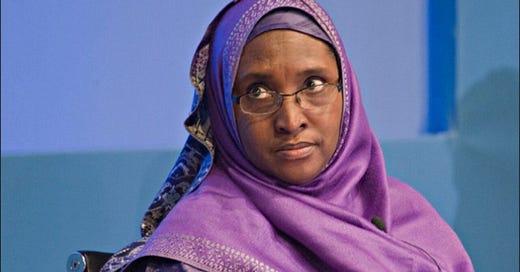Good morning.
We are covering the federal government’s confirmation that it plans to halt subsidy payments by June, an increase in electricity tariffs, and a plan by doctors to shut down all hospitals in Delta state.
If you enjoy this newsletter, please share it with someone. That’s the only way it gets discovered, and I keep writing. Thank you.
FG repeats plan to scrap fuel subsidy
The federal government on Wednesday reiterated its plan to scrap the infamous fuel subsidy program by the end of June.
Speaking at the public presentation of the 2023 budget, the Minister of Finance, Budget and National Planning, Zainab Ahmed, said the government will pay N3.36 trillion for subsidy payments in the first six months.
"Petrol subsidy will remain up to mid-2023 based on the 18-month extension announced early 2022," Ahmed said.
Femi Adesina: The presidential spokesperson said President Muhammadu Buhari could not remove fuel subsidy during his tenure due to social factors.
Quotable: “Each time there is an effort to fight the fraud in the subsidy regime, you have to contend with labour, you have to contend with the people,” Adesina said. “The government needed to weigh its options because of the social consequences in it.”
EFCC: The anti-graft agency recovered about N13 billion as proceeds of illegal payments made under the fuel subsidy regime between 2017 and 2021.
My take: Fuel subsidy has always been a controversial topic in Nigeria. Ten years ago, then finance minister Ngozi Okonjo-Iweala advocated for the removal of the subsidies. Her argument was simple: the system had been compromised and the subsidies were not benefitting the right people. But no one listened to her. Angry Nigerians took to the streets, led by opposition leaders who, since taking over power in 2015, have also maintained the corrupt system.
The messaging that fuel subsidy is a bad idea is not correct. Fuel subsidies, if implemented correctly, can be beneficial to low-income households that rely on fuel to power their homes and businesses; this can help stimulate economic activity as businesses and individuals have more disposable income to spend on other goods and services. The problem is that Nigeria’s fuel subsidy regime is riddled with fraud; oil marketers collect subsidy payments for fuel that was not delivered or is not consumed in the Nigerian market. One report found that between 2009 and 2011, fuel importers were being paid for 59 million litres a day, while the country only consumed 35 million. Till today, there is still no consensus on how much litres of fuel Nigeria consumes.
So the failure to fight corruption within the oil sector is the primary reason why removing the subsidies has become as paramount as ever. Fuel subsidy isn’t the problem, corruption is.
When removed, proceeds that should have gone into the subsidy programme will flow into government’s accounts instead, where they are expected to be efficiently deployed to build infrastructure and invest in health, education, and security. But will it be efficiently spent? Or are we exchanging one fraudulent system for another?
Related: Between January and November 2022, the federal government spent a total of N5.24 trillion on debt servicing, out of its N6.5 trillion retained revenue for the same period. That means 80.6% of total revenue was spent servicing debts. The World Bank’s suggested debt service-to-revenue ratio for low-income countries like Nigeria is 22.5%.
Watch: If you have some time, this four-hour-long fuel subsidy debate in 2011 will interest you.
What else is happening?
Tariff hike: Electricity distribution companies have quietly increased the cost of power, angering customers.
Seeking justice: Amid prolonged fuel scarcity across the country, a group of tanker drivers has accused security agents of destroying products they lifted from refineries.
Terror watch: The secret police, the DSS, said they have arrested a top ISWAP commander in connection with last week’s explosion in Kogi during President Buhari’s visit.
Yakubu Mahmood: Meanwhile, an Abuja high court has barred the DSS from arresting the INEC chairman over false asset declaration.
For the record: The central bank claimed that it followed due process in the sale of Polaris Bank.
Chris Ngige: The labour minister said he will not campaign for a particular presidential candidate because he wants to protect his conscience.
Doctors’ protest: The Nigerian Medical Association has threatened to shut down all hospitals in Delta state after one of its members, Dr. Uyi Iluobe was murdered by gunmen at his hospital on New Year’s Eve.
That’s it for today. Thank you for joining me. Let’s do it again tomorrow.




